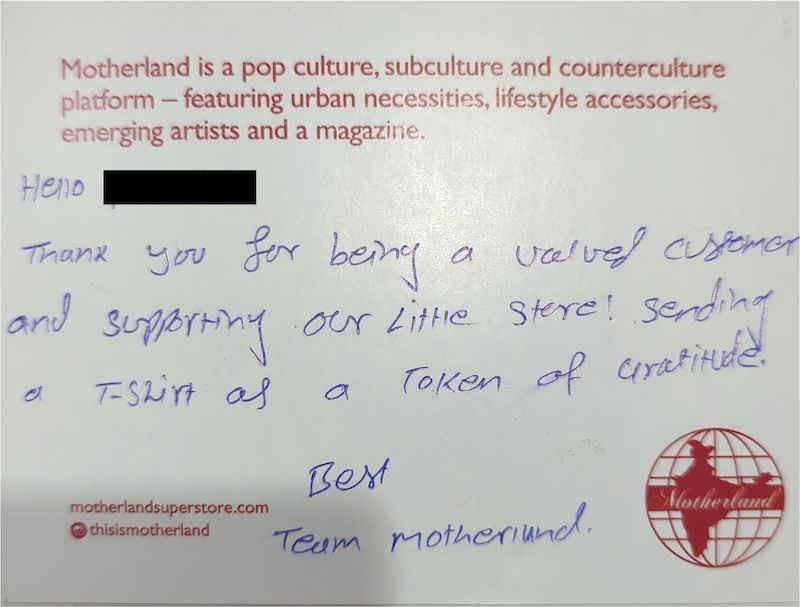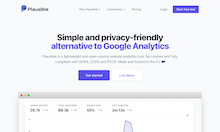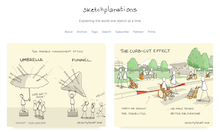We noticed you subscribed but haven’t logged in. If you would like to continue with your subscription, please log in within the next 7 days. If you haven’t logged in, we will cancel your subscription and refund any payments.

 Copied
CopiedFound this on Twitter.
It turns out that Lighter Fluid I think is the perfect metaphor for Venture Capital — not Gasoline. Why? Well, lighter fluid is indeed super helpful for starting fires… dump a little on some kindling … throw a match in, it lights faster and better / kicks things off. It absolutely helps accelerate your time to ‘fire’. It is quite a useful (and fun!) tool. That said, if you dump lighter fluid on a wet log… or really any fire that isn’t well built, then you at best get a nice jolt of fire / show for a few seconds, before the fluid all burns off and you are left with nothing. No fire… just a brief show and lots of wasted lighter fluid. People like to say that Venture Capital is Gasoline… but that really isn’t true. With enough Gas you can make anything burn… logs / even wet ones … will eventually catch — dump enough fuel it works… but that isn’t really how VC works. What you need for dollars to be meaningful is for the fire to be primed, the logs to be dry — the product-market fit to be real, the fire to be well vented and built. Then you throw a little ‘VC’ lighter fluid on top to make things go bigger faster.
 Copied
Copied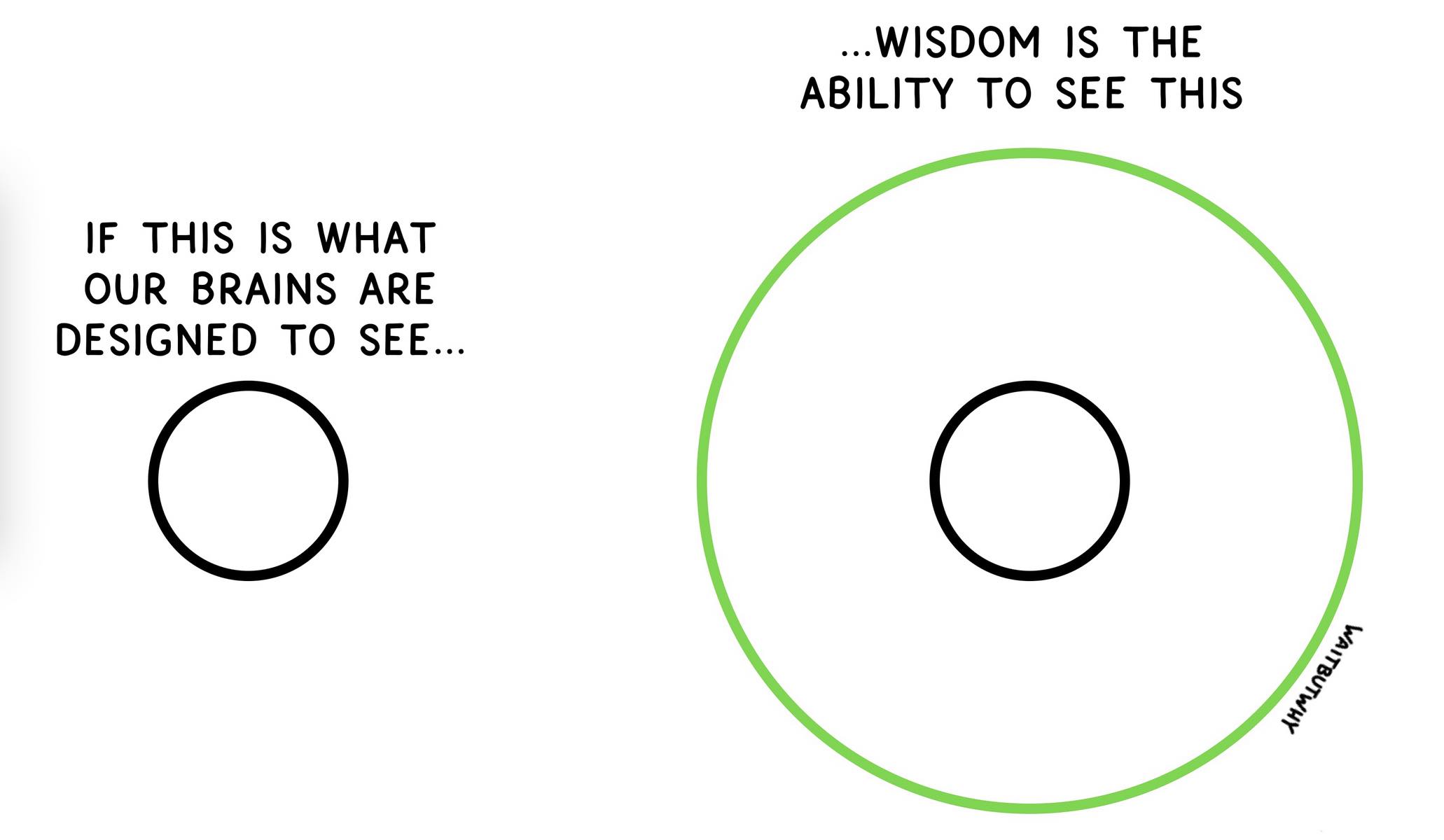
Why it matters to your customer: Typically, in highly technical or highly creative fields, the cost of getting decisions wrong can be high.
Why it matters to you: As you grow older, Labor ceases to be a strong leverage. A younger professional can learn the skill or read up the facts faster and provide the same service at a lower rate. In the longer run, judgment determines what know-how will make you irreplaceable?
- Unlike skills and facts, judgement is something highly technical or highly creative that can only be earned out there in the field through experience.
- Judgement allows you (and you alone) to take better decisions and gives you the wisdom to navigate out of complex situations.
How to build this leverage?
- Build on what you’ve got.
- Build this leverage in a field that you really care about and are genuinely curious about or have a point of view — something specific to your Lived experiences. Something that doesn’t feel like work. Something in which, you, you alone can operate on the frontier of a field by yourself. You dig deeper than other people do, deeper than what seems rational just because you’re interested.
- Build this leverage in a field that is either highly technical or highly creative — something tangible. For example, no one became a CEO by building a career in social media marketing.
- Progressively refine your judgment through years of constant observation, note taking and forming of new associations until you are an authority. You need to be able to observe shifts in the current, as well as connect seemingly disconnected events to explain trends. Think and act independently. Don’t conform.
However, judgment is also restrictive. For example, Sachin Tendulkar has built great judgment in the game of cricket, however that does not make him a good Member of Parliament.
How to signal Judgment? Blog extensively about it. Own up your mistakes or when you change your mind. Take responsibility. Don’t scapegoat.
Examples
- Expert operators drop complexity of the system they operate because they know Complexity slows down execution.
- Expansion in social status hinders truth-seeking and thus discovery of Judgment.
- Loserthink
Footnotes:
- Tim Urban on Twitter: “I might define it like this https://t.co/rwbLTZD9JC” / Twitter
- Dokkodo
- Naval Ravikant
 Copied
CopiedThe only way that we can live is if we grow. The only way that we can grow is if we change. The only way that we can change is if we learn. The only way we can learn is if we are exposed. And the only way that we can become exposed is if we throw ourselves out into the open. Do it. Throw yourself.
-C. JoyBell C.
 Copied
CopiedMoney is also called capital or cash.
Why it matters:
- Money is important because it gives you to freedom to do what you want without jeopardizing the basics of life. A life without sufficient money can leads to powerlessness or ruthlessness.
- It is the most liquid form of leverage that can be converted into other forms of leverage. For example, you can hire people with Labor and Judgment, or Buy your way in to a Owned Network, etc.
- In-hand cash allows you to Build multiple entry and exit options.
- Failure to manage Cashflow leads to Risk of Ruin.
How to get capital to do business:
Below are the ways to get capital:
- Inherit it.
- Earn it. This is a deterministic path but it takes too long. Eventually, you’ll bootstrap a Profitable business and own 100% of the company.
- Borrow it from banks is generally a low probability, high risk option.
- Raise it from six sources:
- Friends and family usually invest in your idea not because they want to profit from it, but because they want to be enablers.
- Crowdfunding works well for opportunities for which good product-market fit already exists. It allows you to sell an idea to an audience prior to building it out.
- Often media startups do not generate high returns. Awards and grants are a good way to raise risk capital: risk-free money to try out the startup and see if it scales.
- After you have launched, join accelerators, to scale up quickly. Preferably seek support from accelerators who specialize in helping media startups.
- Look for high net-worth individuals or angel investors, who are invested in the idea or cause.
- Venture capitalists invest into companies in exchange for equity. They are usually hugely invested in the growth of the venture. Most for-profit VC money is looking for 30% year-on-year growth. However, most media businesses cannot provide that kind of returns.
Footnotes:
- Naval Ravikant
- The Narrow Road, Felix Dennis
 Copied
CopiedJoseph Heller, American novelist and the author of Catch-22.
“Yeah, but I have something he’ll never have: Enough.”
The essence of maintaining work-life balance, enjoying what you do, and building a sustainable operation is having a sense of this is enough — from a sense of satisfaction.
 Copied
CopiedIn order to win, you’ve to first survive. Hence, always take Risk II.
- Risk is what you don’t see.
- Risk I — Risk of ruin: Risks you wont get to continue playing (survive) if you get it wrong. For example, Russian Roulette.
- Risk II — Other risks: Risks you can survive.
 Copied
CopiedOften there isn’t sufficient capital to execute on broad mandates.
“A thin layer of investment spread across everything we do and thus a focus on nothing in particular.”
Reference:
 Copied
CopiedOwned Identity, Owned Network, Investments, Entrepreneurship, and Editorial Product is closer to biology than physics.
- Physics discovers and documents immutable laws that can be observed and verified.
- In contrast, biology (and evolution to be more precise) is based on chance. That’s why there are many breeds of dogs. Similarly, the same tea plant based on its environment (altitude, humidity, sunlight, etc) gives a different taste and smell.
Hence, once you discover the right fit for you, then double down after conviction.
 Copied
Copied
The world around us is already complex and nuanced and we have finite time and capacity to understand it. Online, this problem is exacerbated due to:
- Strategic Communication: We are constantly bombarded with advertising and PR that manipulates our brains into wanting things that might not be right for us. For example, in some cases like the Bournvita’s ads in India, brands resorted to outright manipulation while in other cases, brands might downplay, gloss over, or obscure details that are not in their favor.
- Algorithms: BigTech platforms design algorithms to be addictive, leading to echo chambers, polarization, and misinformation. Paul Graham famously stated that Google used to provide the correct answer but now gives the answer that is right for you.
In this environment, we recommend that brands should practice candid communication, i.e., conveying your best understanding of reality backed by evidence and data. It’s about being genuine, saying what you believe and meaning it. No fluff allowed.
Why it matters: Never exchange honesty for strategy. Regardless of your strategic goals, always:
- Go beyond selling and share your story and engage in a dialogue with your customers rather than talking at them.
- Build your case using reason, data, scholarly literature, and historical context.
- Respect your audience’s intelligence and time. Communicate with clarity and honesty!
- Foster a relationship with your audience where you can discuss difficult truths and shade unpopular opinions with them.
Limitations of candid communication: By compounding on one set of audience and topics, you are beholden to them in the long term. But then, right at the onset we discussed that candid communication is for those who go deep instead of broad. You are unlikely to earn a full salary via the media itself. Though it may add to your passive income.
 Copied
Copied“A healthy man wants a thousand things. A sick man only wants one.”
Confucius
Who has the will to act? Anyone in good health and of reasonable intelligence, provided they utterly commit themselves to the journey.
How: Health is a linear domain, i.e., you need to make progress on it everyday. Hence, it needs to be Habit-forming. Don’t make it too nuanced because Complexity slows down execution.
Physical: When it comes to physical health, always:
- Eat simple, eat less
- Avoid Easy dopamine hits
- Recognize the difference between Exercise builds. Exertion burns.
- Build three forms of fitness: Flexibility, Strength, and Cardiovascular.
Be tolerant with others and strict with yourself.
Marcus Aurelius
Mental: To build mental wellbeing, actively take decisions that lead to One Less Thing To Worry About.
- Embrace impermanence. Don’t be saddened by separation
- Be at home anywhere. You might need to move houses, cities, and countries based on situation. Hence, live in a safe neighborhoods that is conducive to a life of focus and ongoing practice but be indifferent to where you live and your living condition. For example: Do not over invest in furniture and home decor. If you do either keep it low cost and simple so that it can be trashed and bought again when you move or so small that you can pack it up and move.
- Give away things you don’t need. You should proactively let go of Things you own with a sense of gratitude after they’ve served their purpose. Hoarding of things isn’t wise.
- Avoid zero-sum game.
- Tolerant with others: One less thing to worry about: My way.
- Clarity of Purpose: Poor Strategy, or the lack thereof, can quickly turn prioritization into some version of the Hunger Games.
Footnotes:
 Copied
CopiedEither things are in your control or they aren’t. If they are then go ahead and act. If they aren’t then state your preference and logic but don’t be forceful and let society take its natural course of action.
Why it matters: When we have strong preferences but no agency to act on them then we create a dependency on the outside world. This in turn has control over our mood. In such situations, the only way to get things our way to is to play Zero-sum game.
- If it is situation A, then go ahead and act. If it is situation B, then let it go. https://twitter.com/johncutlefish/status/1652351187012980736
 Copied
CopiedDon’t drive life forward looking into rear view mirror of experiences.
There are many forms of separation:
- Separation from things we associate with our identity: people, places, products or companies you build, Capital or wealth, objects, or ultimately death.
- Separation can be temporary or permanent.
- Separation could be due to your own doing or due to situations beyond your control.
When you deeply associate your existence and identity to things beyond your mind, they start owning a significant portion of your mind space and thus when remove create an intense feeling of lacking — a null, void, and emptiness. This in turn leads to suffering and sadness.
Footnotes:
- Dokkodo
 Copied
CopiedTrust is the belief that you’ll act in a reliable and dependable way. It is earned over time through consistent behavior and actions.
Do you have built a reputation for being trusted, reliable, high-integrity, long-term thinkers in an otherwise trust-deficit ecosystem?
 Copied
CopiedEven after you Buy your way in, always give more than you take from a Owned Network.
- Be present: It could be something as simple as not carrying on a conversation with yourself in your head. Instead, be there fully, listen, and care about the people you are speaking to and focus on their interests.
- Provide value to the conversation by teaching, giving a compliment, making a funny comment, or telling a story.
- Finally, be high status and don’t seek approval.
 Copied
CopiedA monopoly owns its market, so it can set its own pricing. Since it has no competition, it produces at the quantity and price combination that maximizes its profit.
Unethical Monopolies: In a static world, a monopolist creates artificial scarcity (political patronage, secures a license from the state, etc.) and becomes a rent collector.
Creative Monopolies: An ethical monopoly is one with Competitive Differentiation, i.e., its so good at what it does that no other firm can offer a close substitute. For example, Google has not competed in search since the year 2000 until OpenAI launched ChatGPT in 2022.
- The world we live in is dynamic: it’s possible to invent new and better things. Creative monopolists give customers more choice by adding entirely new categories of abundance to the world.
- Apple’s monopoly profits from designing, producing, and marketing the iPhone were the reward for creating greater abundance, not artificial scarcity: customers were happy to finally have the choice of paying high prices to get a smartphone that actually works.
- The government knows this and hence we have the patent system.
Footnotes:
- Zero to One
 Copied
CopiedNo matter what you do or what you make Labor, everything has by-products. A futon store in California hosts comedy shows after hours. Henry Ford burned scraps from manufacturing the model T to make Kingsford charcoal. Rework itself is a by-product of years of blogging. The trick is to spot those by-products and see opportunities.
Jason Fried of Basecamp
Examples: Factly, a fact-checking media firm, is monetizing its byproduct — a searchable list of cleaned and organized government data — in the form of dataful.in.
 Copied
CopiedEasy dopamine hits are activities and experiences that give immediate pleasure or reward without expending much effort. This could include empty calorie foods (junk, sugary, salty), doom scrolling on social media, binge watching TV, shopping, porn, drugs, gourmet food, romantic love, etc.
Why it matters: You get addicted to them and it makes you mentally weak.
Nassim Taleb expanded this principle to include:
- Muscles without strength
- Friendship without trust
- Opinion without risk
- Change without aesthetics
- Age without values
- Food without nourishment
- Power without fairness
- Facts without rigor
- Degrees without erudition
- Militarism without fortitude
- Progress without civilization
- Complication without depth
- Religion without tolerance
 Copied
CopiedCashflow is the lifeblood of any profitable business.
- Poor cashflow is a Risk of Ruin. It can happen due to unviable expansion or under capitalization.
- If cashflow is good, then no matter how badly run the company might be, there is always a chance of turning its fortunes around.
Not being on top of Customer Acquisition Cost and payback can severely impact your cashflow: If your CAC is Rs. 10,000 and your Subscription costs Rs. 5,000 per year, then you’ll start earning a payback after 2 years. During this time, you’ll be effectively running a negative cashflow business.
Footnotes
- Felix Dennis
 Copied
CopiedDrinking tea mindfully teaches you to time (sense, observe, touch and smell) when to drink (act). Drink it when its too hot and you’ll burn yourself. Drink it when its too cold, and you’ll not get value from the tea.
- Swinging Hanuman Gadas: Too early or too late and the weight on your wrists rise drastically. Instead you need to swing with the flow.
- Competitive exams: Move too fast and you’ll get your answers wrong. Move too slow and you’ll miss out on the timing.
- Startups: Too fast and you’ll miss discovering Product Market Fit. Too slow and you’ll either run out of cash before finding PMF or you’ll not earn because you don’t achieve area under the curve.
 Copied
CopiedBuild multiple exit and entry options even before the event happens.
Why it matters: Without leverage, you’ll be left without options, making you susceptible to extractive leadership and isolation because powerlessness corrupts.. If you don’t accept, your only other option is to exit the game.
How: Candid Communication gives you an opportunity to meet new people and through them new trends and opportunities. This leads to information asymmetry which is key for building optionality.
 Copied
CopiedNo one can predict the future, but we know two things: it’s going to be different, and it must be rooted in today’s world.
Peter Thiel
Given this, take clear stock of what you’ve got — Capital, Owned Network, Owned Identity, Owned Media, Labor, Judgment, etc. and see what you can build from there. You should always want to Build multiple entry and exit options. But your Lived experiences will it close and which options it might open.
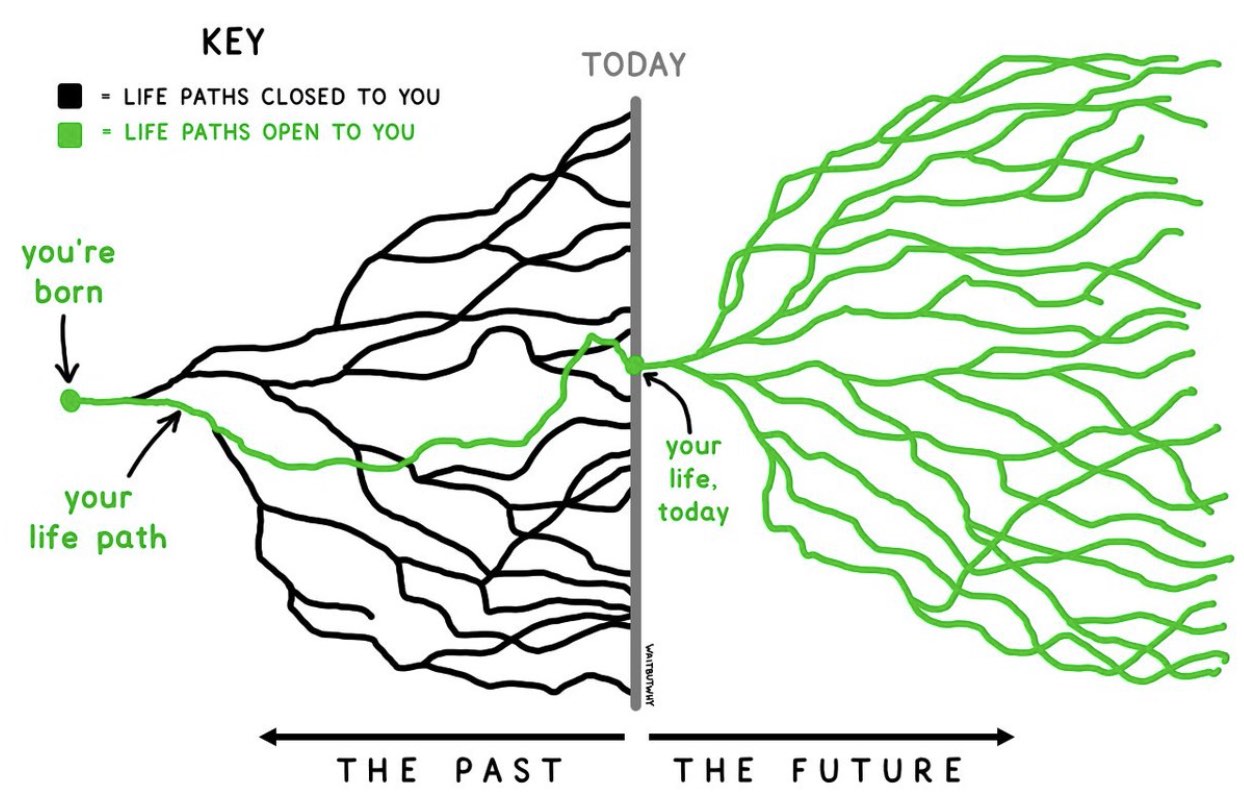
Building resentment or complaining about what you’ve got is against building a life of focus and ongoing practice.
Accept what have you got and focus on what you can act on.
- Personally: Beauty, smartness, gifted ability, or lack of.
- Socially: People will behave foolishly, rudely, ungratefully, take advantage of us, and treat us unjustly.
- Situations: People won’t comply with our ethics and values.
Footnotes:
- Zero to One
- https://twitter.com/waitbutwhy/status/1571562595957489665
- Dokkodo
- Stoicism
- Good Profit, Charles Koch
 Copied
CopiedA painter cannot build his own style (Build an authentic expression of yourself) until he knows the basics of Labor: color, brush, stroke, shading, etc.
 Copied
CopiedBuild a frame of mind that is so strong that you can build authentic expression — express your thoughts, ideas, opinions, world views, and beliefs — unapologetically without consideration of what others might think of them.
Why it matters:
- It helps with Owned Identity: Being authentic helps you differentiate yourself. No two people are alike. Everyone’s Lived experiences — context, knowledge, personality and situation is unique. By being yourself, you are differentiating. The more authentic you are, the less competition you’re going to have. It will also make your brand more real, human, and relatable.
- In a world of Artificial Intelligence generated content, being an authentic real person is Competitive Differentiation
It will also give you the superpower to fail in public and survive.
You cannot be authentic if you don’t Think and act independently. Don’t conform.
How to be authentic:
- Before expressing yourself, master the basics first.
- Curate your beliefs because beliefs define your story: who you are and what do you stand for.
- Build mental strength.
- You should be able to focus on what needs to be done irrespective of how you feel.
- You should be able to control your fight or flight response by proving to your physiological self that you are in a safe environment.
 Copied
CopiedMadness is rare in individuals – but in groups, parties, nations, and ages it is the rule.
Nietzsche
You cannot Build an authentic expression of yourself if you’re socially influenced, i.e., you’re changing your behavior because of someone else. We’re influenced by the sitcoms we watch, people we hang out with, the things people praise us for and what people dislike us for. Alternatively, our mimetic desires get more intense the more connected we are. There are three forms of social influence:
- Conformity: Are you changing your behavior to be like others?
- Compliance: Are you doing something because others asked you to?
- Obedience: Are you doing something because you believe you’ve no other choice?
Additionally, conventional beliefs only ever come to appear arbitrary and wrong in retrospect; whenever it collapses, we call the old belief a bubble. But the distortions caused by bubbles don’t disappear when they pop.
Building Judgment demands that you step back and think from First Principles and decide for yourself. For example, Myth-making around Journalism
Footnotes
- Zero to One – Peter Thiel
 Copied
CopiedPeople have a tendency to attribute value to an individual or company based on their accumulated embodied cultural capital, which can be derived from either their personal identity (such as gender, ethnicity, color, race, caste, etc.) or the distinctive knowledge, perspectives, and abilities they acquire from their unique circumstances.
Why it matters: Recognizing the significance of this, identifying and embracing an Owned Identity that aligns with one’s embodied cultural capital can aid in developing a Niche that is more closely connected to their personal experiences.
- However, this advantage tends to favor those who already possess significant leverage, resulting in unequal opportunities.
How: To leverage this aspect effectively, investing in the art of storytelling can prove beneficial.
 Copied
CopiedThink you cannot innovate in a crowded space? Watch this 30 minute walk through to observe a master class on how someone can reinvent a Calendar in freaking 2024 without the use of AI!
 Copied
Copied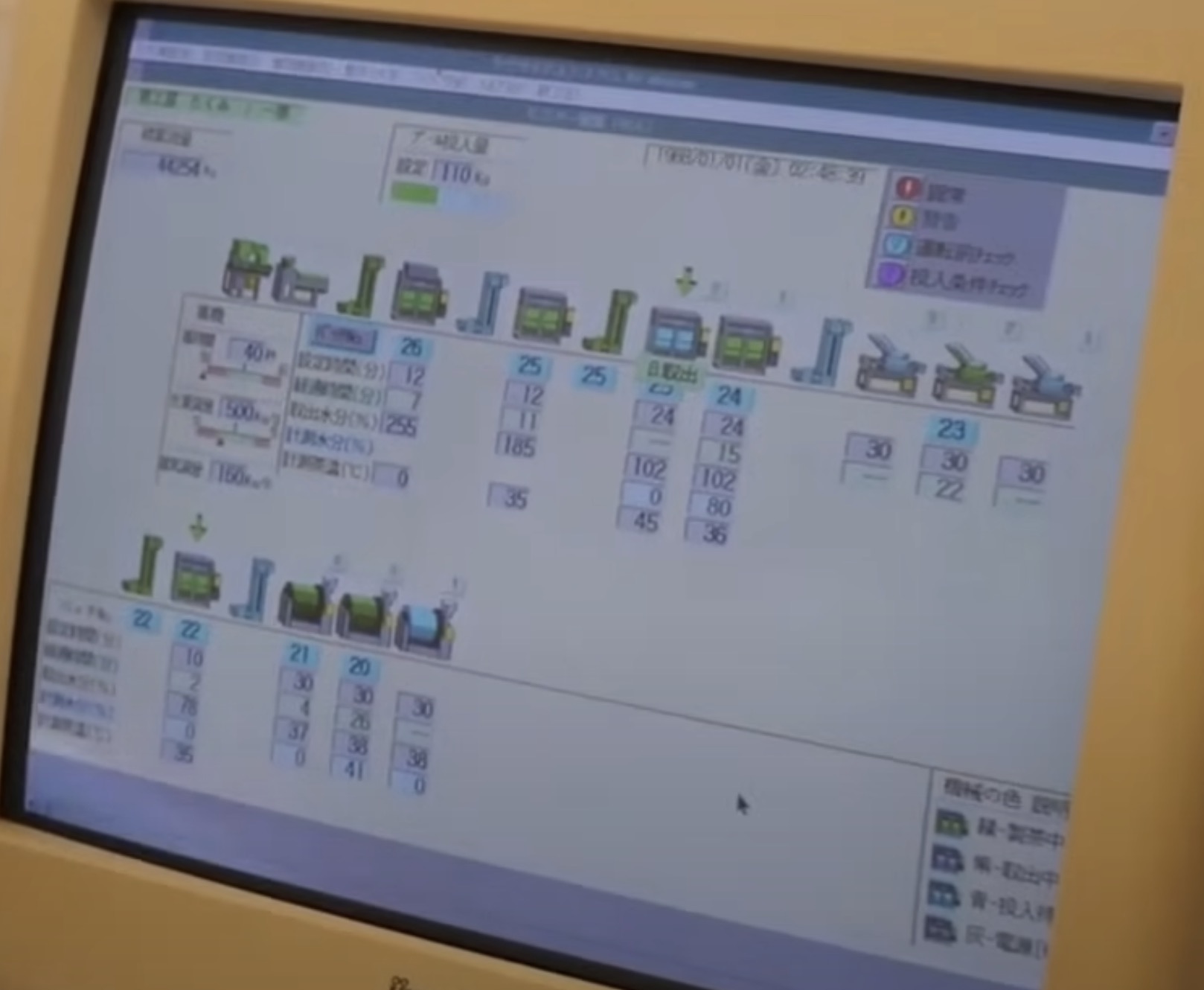
Gyokuro tea processing factory in Japan has a data visualization version of the factory and the operators get real time information of what’s happening with each batch.
Here’s what happens with tea processing:
- Weight input
- Steam to deactivate the enzymes
- Hot air rolling to reduce moisture w
- Hot pain rolling to bring out the flavors
- Hot air rolling to reduce moisture (again)
- Shaping the leaves for consistency
- Sorter to remove clumps
- Packing
All throughout machines suck out low grade dust that gets used in green tea teabags.

 Copied
CopiedIn times of a sensitive polarized situation, recession, downturn or personal crisis, Candid Communication allows you the superpower to fail in public and survive, give constructive criticism, and increase willingness to pay because people gravitate towards trusted Owned Identity and individuals during times of crisis.
 Copied
CopiedThe only way for us to move forward is to encourage and amplify the work of people in your Owned Network who are willing to learn, to see and to commit to making things better.
 Copied
CopiedThe myth-making around journalism, much like the myth making with entrepreneurship, social work, professional sports, politics, etc. is destructive.
It surrounds young professionals with stories of others doing the same thing as them, a few successfully but all with a good degree of swagger, so much so that they tend to ignore the risks of their undertaking.
If there was any honesty among those who teach and promote journalism, they would tear down the inspiring quotes and hand out posters saying “You wrote that ground breaking story to challenge that powers that be — and all you got was few Likes on Facebook from your peers, a bunch of anger from trolls and a lousy eviction notice.”
But they don’t because there is a countervailing force at work. There is a profound psychological need which journalism can satisfy. To succeed as an investigative reporter is a form of heroic achievement in any political climate, but particularly in one that your cult deems hostile.
To hold billionaires and powerful politicians accountable affords you fawning respect, fan following and invitations to speak at prestigious universities.
Independent Journalism accelerates this process. It allows individuals a shot at the even deeper pleasure of doing work that they cannot do while working for others.
 Copied
CopiedThe artefacts you own can symbolize what you stand for.
Why this matters:
- Often the things you own can give you temporary access to other people who want to experience those objects.
- The storytelling around those objects not only communicates that you’ve the ability to buy these objects but also to appreciate their significance and value.
Examples: The display of high-end bookshelves behind you in the backdrop during video calls (Zoom).
 Copied
CopiedIn a free market, a profitable product is one that participates without distortions —grants, government subsidies, political favors, donations — and creates superior value compared to other accessible alternatives while consuming fewer resources.
- It is good for customers because the product is better (superior value) and possibly cheaper (consumes fewer resources).
- It is good for business because such products create surplus (profit or time or raw materials), which can then be reinvested or used somewhere else.
Both are required because we operate in the free market and hence cannot force any stakeholder — employees, suppliers, or customers — to work with us. They’ve to voluntarily choose us.
Footnotes
- From Charles Koch’s book, Good Profit.
 Copied
CopiedMake something of value that others want but cannot get easily.
For yourself
Why it matters: The most deterministic way to earn money is to either produce something — product, article, podcast, book, etc. — of value and finesse or to offer your services as a builder (skilled labor) to those someone who want to build.
- This path is deterministic because with sufficient time, determination, and focus, you can learn hard skills without seeking anyone’s permission.
- Builders tend to have a tonne of failures. However, they need one big success to make it big.
How to build builders:
- Before expressing yourself, master the basics first. Builders learn by looking at the work of others: open source, biographies, etc. Having observed, they perfect their practice by doing. Hence, much like an athletes, painters, carpenters, etc. builders keep on practicing their art. Until you get good, subsidize your building by getting a day job.
- Then you Build an authentic expression of yourself.
How to spot builders?
- While most purchase university degrees to signal capability, a better way to look for builders is to look at their work in a chronological fashion — they’ll leave behind a trail of explorations.
- Builders also have a very strong action bias.
- Finally, in conversations, builders can easily swivel between macro details (why and what) and then deep dive into the nitty-gritty (how).
At the level of a society or company
Why it matters:
- At the level of an economy, growth is instigated by enough builders and entrepreneurs who exploit an untried technological possibility to manufacture a new commodity or producing an old one in a new way.
- Strategically, ideas are content or media and don’t amount to much unless one has the will and skill to bring them to life.
The easiest way to get things done is to hire a small group of builders bounder together by a sense of mission.
Downside
You are restricted by what you cannot do.
Footnotes:
- Joseph Schumpeter
- Hackers and Painters
- The Narrow Road, Felix Dennis
- Zero to One
 Copied
CopiedWhen you pursue the pleasure of the tongue, you stop appreciating simple food — food that is made with less ingredients, less preparation, and least processing.
Why it matters:
- Eating rich food leads to Easy dopamine hits. Over time this transitions into gluttony (over-eating), which eventually results in bad health. Once we’ve reached this point, we eat only to seek comfort from the pain of food craving.
- More importantly, you need to eat food that gives appropriate nutrition for a life of focus and ongoing practice.
Examples: Below are examples of low ingredient foods:
- Sushi — simply vinegar-rice with raw fish
- Black coffee or green tea without milk and sugar
- Hummus — chick pea paste with olive oil
- Do intermittent fasting
Footnotes:
- Dokkodo
 Copied
CopiedWhat is the difference between exercise and exertion? If the amount of effort, tiredness and mental fortitude required for either is same, then what differentiates between exercise and exertion?
There’s only one answer — Who is driving it?
If you voluntarily make yourself go through pain and hardships towards a goal, then every day is fun and happy because your eyes are set on the goal. If the world is making you go through pain and hardships, then every day is like a slow death.
Related reads: Anti-fragile.
 Copied
CopiedAnti-Fragile systems not only withstand shocks but improve as a result. They learn from adversity, adapt to changing circumstances, and evolve to be more robust. For example:
- Exercise builds. Exertion burns.
- Vaccines and some exposure to diseases improves overall immunity.
- Regular bubble bursts overall weeds out the weakness in the economy
In contrast: Most systems are either fragile or at best resilient.
- Fragile things and systems are vulnerable to shocks and disruptions. For example, glass, weak minds, unprofitable businesses, etc.
- Resilient things and systems can withstand shock and return to their original state after being disrupted. For example, buildings that are designed to withstand earthquakes.
How to build anti-fragility:
- Mindset: See uncertainty and volatility as opportunities to learn.
- Prepare: Actively do things that enhance margin of safety (resilience)
- Buy your way in Owned Network
- Build Profitable business in a high-margin industries.
- Avoid centralized dependencies. Build multiple entry and exit options.
- Short term pessimism and long term optimism helps you stay focused.
- Most importantly, be prudent because It is easier to de-grow than to grow.
- Take risks, but within your margin of safety, i.e., avoid making bets that, if unsuccessful, could lead to the Risk of Ruin.
- Subject your system to controlled levels of stress (variety, volume or velocity) and pressure.
- Do a pre-mortem, i.e., imagine what scenarios would lead to failure.
- Learn: Observe failures objectively to identify weaknesses and areas of improvements. Work on them.
- Build feedback loops across the system to enable information flow.
Footnotes
- Nassim Nicholas Taleb
 Copied
CopiedWinning is better than losing, but everybody loses when the war isn’t one worth fighting for.
Peter Thiel
In zero-sum games, for someone to win another has to lose.
Why it matters: It is important to identify zero-sum games and avoid them because the resulting drama distract us from what matters strategically.
- It makes us hallucinate opportunities where none exist.
- It takes significant time to play status-games because status needs to be known, signaled, and maintained.
- Those who play zero-sum games don’t attract opportunities from long-term players.
- In zero-sum industries, prestige is given much higher weightage than merit.
In contrast: Be on the look out for and play Positive-sum Games.
What causes it: Zero-sum games are triggered by scarcity, conformity, and status-seeking.
- Competition happens when it isn’t feasible to create net-new things and there is isn’t enough money (store of value) to go around. This happens in industries like real-estate, etc.
- In some industries, success is rewarded with status instead of money (store of value), for example, in academia, news and media, identity politics, managers in a dysfunctional organization, etc. In such situations, signaling becomes a better means for advancement than actually doing the work. In contrast, incumbents play the role of gate-keepers.
- A rookie in a cricket team doesn’t resent a pro. However, when hierarchies are built without any meaningful criteria and merit, it degenerates into a zero-sum game. For a number 2 to be number 1, the number 1 must be brought down.
To break free from zero-sum games:
- Think and act independently. Don’t conform.
- Think in Building Blocks
- Build on what you’ve got.
 Copied
CopiedFocus is concentrating interest and activity on one thing.
It’s a strategy best suited for those committed to the long game, building their Judgment and credibility in a specific field, and those devoted to cultivating their Owned Identity, business, or initiatives as their life’s work.
In fact, they are well-positioned to run their own media operations, thanks to their education, mindfulness, and thoughtfulness. They have the content ready!
Who are we talking about?
- Professionals such as academics, researchers, reporters, policy makers, consultants, analysts, and think tank members who develop deep Judgment in their study field.
- The “Fortune 50 million” rather than the Fortune 500—sustainable Work Products earning an honest living, solving specific problems for a clearly defined customer base (Niche).
- Enthusiasts and hobbyists with a profound appreciation for their chosen subject or activity using Passion work products.
- Independent media and content creators dedicated to telling the truth using Candid Communication.
- Investors who’ve spent decades building their credibility and stand to lose from short-term, opportunistic decisions.
They tend to invest in things that don’t change. They’ve built up credibility over decades and have things to lose from taking short-term, opportunistic decisions. Eventually, they tend to become Anti-fragile. For example, Amazon believes that most of their investments are focused on three evergreen factors: lower prices, more choice, and faster shipping. They avoid the Peanut Butter Manifesto.
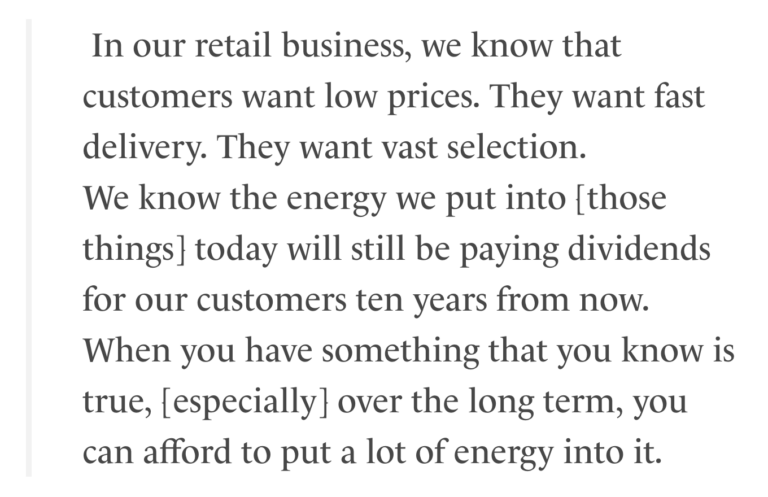
It is not for everyone!
- Venture Capital funded products, if not profitable, may get axed (remember Google Reader), acquired (recall Posterous, Nuzzel), or simply fall out of fashion (think Orkut).
- It also fails in organizations with extractive monopolies or businesses causing negative externalities like oil or tobacco.
- This approach is not suitable for professionals in strategic industries such as law, politics, and diplomacy.
- It isn’t suitable for those who chase what’s trending online for the sake of standing out, the focus here is on enduring value, not transient trends. Fast fashion flaunting influencers and Instagram-friendly food might get attention, but they lack long-term depth.
- Beyond these categories, Candid Communication does not work for snake oil salesmen. Their modus operandi often involves altering opinions, personality traits, accents, and behaviors to suit their audience. They cherry-pick facts, favoring only those that benefit their narrative. These individuals project grand ideas without delving into the nitty-gritty of implementation, often complicating simple matters to disguise their lack of detail. Additionally, they tend to gravitate towards industries involving large sums of money but marked by low accountability.
Footnotes:
 Copied
Copied

